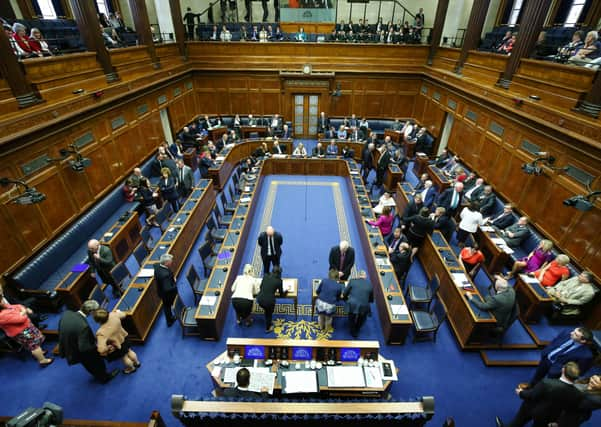Philip McGarry: The malign two tribes concept of Northern Ireland, Catholic and Protestant, is not just sectarian but out of date


Some people wondered if this might lead to a real increase in community cohesion.
However as time has gone on the old fault lines have become more apparent.
Should we be that surprised?


Advertisement
Hide AdAdvertisement
Hide AdIn truth our underlying divisions run very very deep, and indeed reach back into childhood.
Recent research from Queen’s University Belfast (QUB) and University College Dublin (UCD) showed that 5 to 11 year olds still ‘differentiate others on the basis of non visible social categories including religion and nationality’.
Seamus Heaney wrote: ‘Compared to the Irish, smoke signals are loud.’
Anna Burns, in her Booker prize winning novel ‘Milkman’ perfectly captures our divisions with references including: ‘the opposite religion’; ‘our shops, their shops’; ‘our side of the road’; and ‘the right butter, the wrong butter’ (the latter must appear totally bizarre to anyone from outside Northern Ireland!).
Advertisement
Hide AdAdvertisement
Hide AdThe 1998 Agreement was largely predicated on the basis that violence was the problem. However in truth violence was a secondary (and pernicious) symptom of the underlying division.
Removing the violence was not alone going to solve the problem.
One of the pillars of the agreement was the requirement for assembly members, on arriving at Stormont, to designate as ‘unionist’ or ‘nationalist’.
This system, unique in democratic societies, entrenched division at the heart of political structures that were supposed to bring us together.
Advertisement
Hide AdAdvertisement
Hide AdIt played into the construct that there are ‘two communities’ which are fundamentally separate, based on religious/ethnic division.
MLAs are essentially asked to live their entire political lives wearing either a Celtic or a Rangers jersey!
It is hard to blame the five year olds when our much lauded agreement is rooted in division.
The ‘two communities’ concept is particularly malign as it elides ‘Catholic’ with ‘ nationalist’ and ‘Protestant’ with ‘unionist’.
Advertisement
Hide AdAdvertisement
Hide AdConsequently anyone whose parents were only notionally Catholic or Protestant, is firmly marked down as having a predetermined set of political views, including being likely to vote for or against a united Ireland.
While we may smile at Anna Burns’ peerless depiction of a totally sectarian society, we cannot deny that our current political/ cultural system consciously recreates it.
The book describes a proto-feminist group; however it is forced to disband because one member is from ‘the other side’.
Similarly, in the assembly it is impossible even to be a socialist/ social democrat, as the rules insist you can only be a nationalist or a unionist!
Advertisement
Hide AdAdvertisement
Hide AdDuring the ‘Troubles’ the question was often asked: ‘Why do people hate so much?’.
In reality pure hatred was much less prevalent than sometimes thought.
Human beings always experience a huge complexity of emotions, thoughts and beliefs.
What did and still does drive division is the concept of ‘the other’.
Advertisement
Hide AdAdvertisement
Hide AdWhen society is structured around the narrative of two separate and immiscible groups of people, there is always the potential for things to go wrong.
When there is a story of an apparently strong ‘other side’ having done or threatening to do bad things to ‘our side’, we can too easily tolerate — primarily on the basis of anxiety and fear — terrible things.
George Orwell said: ‘There is no crime, absolutely none, that cannot be condoned when committed by ‘our side’.’
The journalist Suzanne Breen showed the truth of this when interviewing in the Sunday Tribune a woman after the Omagh bomb in 1998 who said: ‘They may be b......s, but they’re our b......s’.
Advertisement
Hide AdAdvertisement
Hide AdHowever all is not grim; indeed in some ways the people are well ahead of the politicians and commentators.
The Northern Ireland Life and Times Survey, a rigorously academic exercise running since 1998, reported in 2019 that 18% of the population do not identify as belonging to any religion.
Most crucially, while 26% of people identified as ‘unionist’ and 21% as ‘nationalist’, 50% identified as neither of those two (this rose to 59% among the under 25s).
The ‘two communities’ construct is not only sectarian, it is out of date.
Advertisement
Hide AdAdvertisement
Hide AdCoronavirus does not respect borders. This implicitly challenges the value system of nationalist leaders around the world, from Presidents Trump, Bolsanaro and Duterte, to Prime Ministers Orban and Johnson.
And the same applies to our own divisions. This is a struggle between humankind and a lethal microorganism.
The virus has no concept of the — to us — all consuming differences between Roman Catholics and Anglo-Catholics and Protestants.
This crisis will end.
There will then be an opportunity for a root and branch appraisal of our whole way of life.
Advertisement
Hide AdAdvertisement
Hide AdPerhaps, having seen how people in Northern Ireland actually do genuinely care for each other in ways that even the most optimistic might not have anticipated, we can start to create, in the words of Lyra McKee’s sister: ‘A society in which labels are meaningless.’
What better legacy of this dreadful time can there be for our children and future generations?
• Dr Philip McGarry is a consultant psychiatrist and former Alliance Party chair
——— ———
A message from the Editor:
Thank you for reading this story on our website. While I have your attention, I also have an important request to make of you.
Advertisement
Hide AdAdvertisement
Hide AdWith the coronavirus lockdown having a major impact on many of our advertisers — and consequently the revenue we receive — we are more reliant than ever on you taking out a digital subscription.
Subscribe to newsletter.co.uk and enjoy unlimited access to the best Northern Ireland and UK news and information online and on our app. With a digital subscription, you can read more than 5 articles, see fewer ads, enjoy faster load times, and get access to exclusive newsletters and content. Visit https://www.newsletter.co.uk/subscriptions now to sign up.
Our journalism costs money and we rely on advertising, print and digital revenues to help to support them. By supporting us, we are able to support you in providing trusted, fact-checked content for this website.
Alistair Bushe
Editor